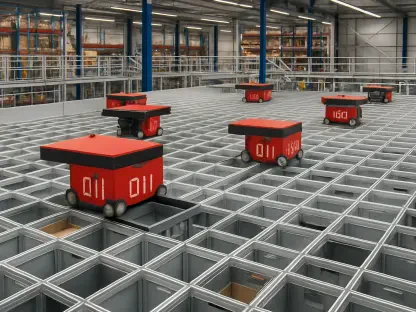The evolution of the deeptech hardware sector within Europe has been marked by a pronounced shift in focus from immediate revenue generation towards prioritizing technological advancement. The recent Deeptech Hardware Napkin report from First Momentum Ventures illustrates this shift, offering a nuanced exploration of trends in fundraising dynamics for startups across Europe. This report, drawing inspiration from SaaS models in its structure, combines diverse data from 2024 to 2025, shedding light on the investment landscape for deeptech innovations, including semiconductors, photonics, and robotics. It presents insights gathered from numerous European venture capital firms, thus emphasizing the growing emphasis on technological milestones over commercial readiness for early-stage investments.
Investment Trends in Deeptech Hardware
Emphasis on Technical Milestones
A significant transformation has emerged in the investment strategies employed by venture capitalists in the European deeptech hardware arena. These strategies now increasingly value technical milestones over immediate commercial returns, a trend highlighted by the Deeptech Hardware Napkin report. Evidence from the report shows a remarkable statistic: about 90% of Pre-Seed companies are led by founders with PhDs, yet fewer than 40% boast relevant industry experience. Such findings underscore a distinct inclination towards nurturing technology-rich startups, with technical risk taking precedence over commercial track records. This preference illustrates that investors are more willing to embrace the uncertainties of early-stage technological development if the long-term potential appears promising.
While technically sophisticated startups are noted, survey data signals some challenges in maturity compared to their counterparts from previous years. However, this hasn’t deterred investors. An undeniable appetite for technology risk persists within the ecosystem, with many startups remaining at the concept or laboratory demonstration stages. Interestingly, only 30% of Series B companies reported having a revenue stream, yet they still attract considerable investor interest. Evidently, these findings affirm a prevailing belief within the industry that innovative technical potential can successfully outweigh immediate revenue concerns when determining a startup’s attractiveness.
Role of Academic Founders
The reliance on academic founders in European deeptech hardware startups is another aspect receiving considerable attention. The report highlights the prevalence of entrepreneurs with advanced degrees leading these ventures, revealing a trend towards valuing academic expertise over serial entrepreneurial experience. Despite the relatively nascent stage of Europe’s foray into deeptech hardware, this trend is marked by a scarcity of seasoned serial entrepreneurs, contrasting sharply with the more established American market. Research conducted by Dr. Maximilian Ochs, a contributing author of the report, suggests that this inclination arises from Europe’s growing but still developing ecosystem in this domain.
Furthermore, the prominence of founding teams with rich academic backgrounds characterizes the deeptech hardware scene. These teams, while lacking extensive commercial experience, often possess unparalleled technical insight that can propel novel innovations. The report underscores this divergence from traditional business models, reflecting an industry habituated to prioritizing technological advances as essential drivers of value creation. As the ecosystem continues to mature, the contribution of academic founders will likely shape a path towards more refined deeptech innovations, integrating academic findings with practical applications capable of fostering impactful technological progress.
The Intersection of Funding and Innovation
Valuing Early-Stage Technological Innovation
The deeptech sector across Europe is witnessing a robust period of growth, cultivated by an intersection of innovation and strategic funding. Startups in this sector are attracting attention by emphasizing technological innovation as a cornerstone of their value proposition. According to data presented in the Deeptech Hardware Napkin report, a venture’s ability to achieve a successful lab demonstration is becoming an increasingly important milestone. Even at the Pre-Seed stage, close to 60% of companies had reached this level of advancement, reflecting the sector’s collective effort to prove the feasibility of cutting-edge technologies.
The push towards early-stage technological innovation aligns seamlessly with investors’ appetites for identifying breakthrough capabilities in unproven markets. Notably, Series A and B companies often succeed in raising substantive investment, even absent significant revenue figures, if they demonstrate commendable technological steps forward. European startups are being molded into resilient entities capable of adapting to industry demands. By prioritizing future market potential over immediate financial returns, these startups create exciting avenues for growth, setting a foundation for technological advancements that promise to reshape industries.
Public Funding and Industry Dynamics
In the dynamic landscape of deeptech hardware, public funding emerges as both an aid and a challenge. Although the report notes an uptick in public grant availability, it cautions against an overreliance on such funding sources due to inherent uncertainties and delays. Dr. Ochs echoes this sentiment, suggesting startups maintain funding strategies that integrate public funding prudently, without losing sight of self-reliance and private investment methods. Adopting diversified funding approaches allows startups to sustain momentum even amidst challenging times.
Early customer involvement further enriches this industry dynamic, providing startups with real-world insights to guide tailored development efforts. In a domain known for its considerable capital expenditure (CAPEX) demands and elongated innovation cycles, engaging with customers early becomes vital for progressing toward market alignment. By integrating customer feedback during foundational stages, deeptech ventures can align innovative pursuits with actual market needs, resulting in calibrated solutions capable of advancing industry standards. Seeking customer validation thus becomes an instrumental strategy in cementing a startup’s position within this complex landscape.
Navigating the Future of Deeptech Hardware
Strategies for Future Growth
A comprehensive overview of the deeptech hardware landscape underscores a maturation of the ecosystem, especially as more Series B deals emerge. This maturation signifies a natural progression towards a structured and expansive funding environment for deeptech in Europe. Though the journey has been challenging, the industry continues to demonstrate a steadfast commitment to fostering early-stage innovation. The report indicates a vigorous pursuit of less mature technological stages, which highlights an enthusiasm for incremental advancement and groundbreaking discoveries.
Despite hurdles, entrepreneurs, investors, and various stakeholders demonstrate a collective resolve to guide the sector through evolving phases. By leveraging innovative technological solutions as integral components of investment strategies, players across the deeptech domain stand poised to capitalize on burgeoning opportunities. Industry participants are encouraged to adopt a proactive mindset, harmonizing technological milestones with strategic initiatives that propel them towards futuristic market opportunities and long-term success.
Acknowledging Technological Advancement
In the European deeptech hardware sector, venture capitalists are shifting their investment focus by prioritizing technical achievements over immediate financial returns. This shift, captured in the Deeptech Hardware Napkin report, reveals that nearly 90% of Pre-Seed startups are led by PhD-educated founders, though less than 40% possess industry-specific experience. Such statistics highlight a clear trend towards supporting technology-driven ventures, prioritizing technical risk instead of early commercial success. Investors show willingness to embrace the uncertainties of nascent technological innovations if the long-term potential is promising.
Despite technically advanced startups facing challenges in maturity compared to previous cohorts, investor interest remains robust. Many ventures remain at the conceptual or lab demonstration phase but continue to garner considerable attention. Notably, only 30% of Series B companies report revenue streams, yet attract significant investment. This trend underscores a widespread belief that groundbreaking technical potential can outweigh short-term revenue considerations when evaluating a startup’s potential.









